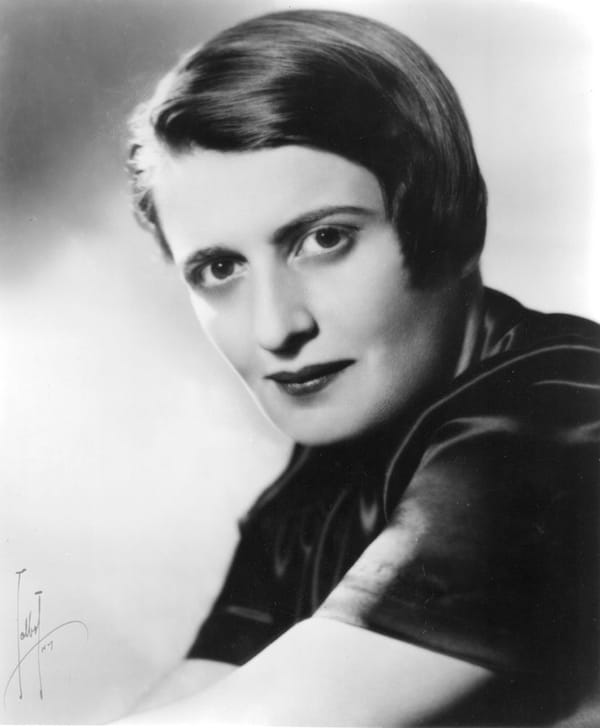The Book of Ayn
By Lexi Freiman
Catapult, 240 pages, $27
T he Book of Ayn, the latest novel from the Australian writer Lexi Freiman, follows Anna, a novelist who is relegated to the outskirts of literary society after a New York Times reviewer pans her book for being “classist.” Even as Freiman skewers the closed-mindedness of the publishing world, she points up the follies of bootstrapping ideologues, reminding us that the cure can sometimes be as bad as the disease.
Anna takes up reading Ayn Rand, the Russian-born writer whose novels preached a philosophy of enlightened selfishness, after meeting a group of “pilgrims” touring Randian sites in New York City. Her friends are shocked, but the more people condemn her for reading the notorious “radical for capitalism,” the more enthralled she becomes. Above all, she receives Rand’s exhortations to self-reliance as a refreshing antidote to the victimhood valorized in her social and professional circles. She attempts to forge a Randian lifestyle, relying solely on herself and refusing to make excuses, while also emulating Rand’s romantic pursuit of younger men. “I believed what Ayn said: To be a full-time genius, there simply wasn’t time for progeny,” she tells her mother, who asks her why she won’t settle down already and start a family. She chases after flings with young men because it makes it easier for her to eschew the un-Randian prospect of commitment and responsibility to others.
Rand’s insight, Anna believes, lies in her recognition of the way that people justify violence and dehumanize individuals by imagining they are “confined to powerless groups striving for collectivist ideals.” Hence, the theory of the “Spiritual Parasite—a person who rejected the responsibility of judging things for themselves,” as Anna puts it. Soon, Anna finds Spiritual Parasites everywhere she looks, like the “young woman in a fedora” across from her in a restaurant who “was compulsively photographing her huevos rancheros.”
Freiman is less interested in evangelizing self-reliance than in playfully dramatizing the triumphs and errors that attend a bootstrapping individual’s endeavors in self-help. For example, while Anna prefers a Randian love life to indulging feminist tropes that celebrate women “who don’t need no man” or cast all men as victimizers, she also encounters the limits of Rand’s outlook. By following Rand’s cues, Anna damages her relationship with a longtime friend who suffers from Lyme’s Disease, telling her that accepting provision from others “will just keep you in need of care.” Later, Anna attempts to rationalize her scorn for her friend’s neediness, telling herself, “Human beings were not so weak and susceptible. Individuals could still think themselves into better futures. If you didn’t believe that, how could you ever be anything but a victim?”
After devouring one Rand book after another, and enmeshing herself in outrageously Oedipal relationships with younger men, Anna finally reaches her breaking point with her new idol. In a bathroom scene as grotesque as it is poetic, she implores a range of deities (God, dogs, Ayn Rand) to stop a toilet bowl from overflowing. As the “sludge breached the toilet rim like a belly-crawling black beast” and spreads across the floor of her latest lover’s bathroom, Rand morphs from savior to scapegoat. “It was all Ayn Rand’s fault. The burning forests, the homelessness, the guns, the suicides, the drugs. Her bad ideas were behind everything. Big Pharma, the billionaire space race, the gig economy, Twitter, the emptiness of modern life … Ayn was the cause of it all.” Anna recoils from her reflection in the “fetid brown soup” and remembers a rather absurd line from Rand’s last interview: “I will not die; it’s the world that will end.”
Rand, she realizes, hated paradox, “the very thing that made art good and life mysterious and unknowable and, in a meaning-making sense, worth living.” Worst of all, Rand “had no sense of humor.” Anna finally understands why she was drawn to Rand’s worldview: “I had always been too generous with the disreputable side, too indiscriminate and expedient with my philosophical alignments. And now, like an idiot, I had extended all that willful generosity to Ayn Rand.”
In _The Book of Ayn, _defecation is symbolic of shame and disappointment—and, one hopes, of purging. The abysmal mess on the bathroom floor echoes the oration delivered by John Galt in Rand’s 1957 novel Atlas Shrugged, in which he insists not to “let your fire go out, spark by irreplaceable spark in the hopeless swamps of the not-quite, the not-yet, and the not-at-all.” But Anna’s hopeless swamp was created by her blind adherence to Rand’s philosophy.
“Rand isn’t the end of her spiritual quest.”
Rand isn’t the end of her spiritual quest. At the novel’s close, Anna abandons a Sufi-inspired, Burning Man-esque retreat on the Greek island of Lesbos after trying, and failing, to kill her ego. She makes her way to Athens, where she watches the sun descend on the Parthenon. She laments never having believed “in much of anything. Except, maybe, books,” which, unlike most of the humans she’d encountered, “could stomach paradox, and knew that both things—good and bad—could be true.” “Great art,” she muses, “was a gateway to the sublime. Why had I been listening to the righteous ramblings of a child?”
Perhaps what makes Freiman’s book so compelling is her ability to use wit and humor to open our eyes to paradox. Showing how attempts to “make the world a better place” are often just a means to feed our fragile egos, she invites readers to laugh at themselves a little and to take themselves less seriously. Though she never offers any definitive answers or solutions, Freiman implies that those who are more in touch with reality than with feculent abstractions—however noble—are most likely to be of real service to the world.
